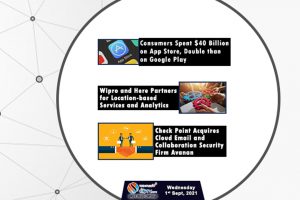Capgemini has unveiled a new Sustainable IT offering, designed to help clients reduce their IT carbon footprint. Sustainable IT is a building block of Capgemini’s global sustainability offering framework. The Group is in a unique position to support clients on their sustainability journey through its technical expertise, customized approach, and strong partner ecosystem.
IT generates 4 percent of global CO2 emissions and consumption is expected to increase three-fold from 2010 to 2025. Organizations across sectors must both reduce their carbon footprint and become enablers of positive climate action. A recent report from the Capgemini Research Institute suggests that 61 percent of organizations which have built a comprehensive roadmap to accelerate sustainable IT implementation have realized improved ESG scores, 56 percent have seen improved customer satisfaction and 44 percent have witnessed tax savings as a direct result of sustainable IT practices. Moreover, companies that have already scaled sustainable IT use cases have achieved 12 percent cost savings on an average.
New offering goes beyond IT consumption
Capgemini’s new offering goes beyond structurally transforming IT in terms of consumption habits and ways of working, to empowering clients to create a culture of sustainable IT that is organization wide. Capgemini works with clients to provide qualitative and diagnostic tools that establish baseline business approaches to sustainable practice. Across business functions, Capgemini takes a holistic approach to identifying a company’s emission hotspots and reducing their environmental impact.
“Sustainability is a key pillar of our strategic ambition and we are committed to helping our clients achieve their net zero objectives. Sustainable IT is the first block of Capgemini’s new sustainability offering framework, which is the backbone of a climate positive future. Organizations must re-assess their sustainability approaches to unlock the potential of smart technologies and move from a net-zero strategy to green product and service experiences,” said Aiman Ezzat, CEO, Capgemini.
The offering has already been applied to several key clients in the banking, insurance, utilities, manufacturing, public services and energy sectors.
It is based on a holistic, four-pillar framework focusing on:
Sustainable IT strategy: Setting a shared vision that includes qualitative and quantitative analysis of an organization’s IT environmental impact. Quantitative analysis includes ‘Life Cycle Assessment’ methodology that covers the impact of devices, infrastructures, applications and data. This enables organizations to assess their sustainable IT maturity score, allowing them to develop the right roadmap to achieve their sustainability goals.
Sustainable IT transformation: Leveraging 50 existing levers identified to reduce carbon emissions generated by enterprise IT through hardware, infrastructure, data and software. This transformation pillar includes levers such as server optimisation, cloud migration, application eco-design, streamlining data or the sustainable IT module of Capgemini’s proprietary economic Application Portfolio Management (eAPM) to not only reduce carbon footprint but also cut operating costs.
Sustainable IT employees: Evolving employee IT consumption habits and ways of working to embrace a culture of Sustainable IT through a set of engagement tools and training programs, which can be readily deployed to accelerate the sensitization and mobilization of the workforce.
IT for sustainable business: Leveraging new technologies like Internet of Things (IoT), Augmented Reality (AR), Virtual Reality (VR), and Analytics to address the environmental challenges of an organization that enables efficient data capture, evaluation and analysis, monitoring and control, supports decision making. It is enriched and facilitated by Capgemini’s Applied Innovation Exchange network globally.






















